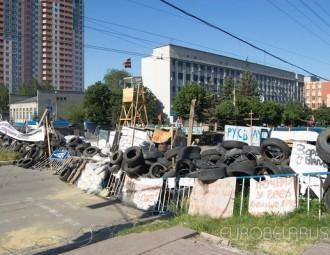The illusion of Novorussia. A parallel reality.
 photo by EuroBelarus Information Service/ Pavel Dobrovolsky
photo by EuroBelarus Information Service/ Pavel Dobrovolsky
After the Ukraine has elected a new president, law enforcement officials renewed an anti-terror operation (ATO) in Donetsk and Lugansk.
How is life going on there under the rule of separatists? Do locals support them? The reporter of the “EuroBelarus” Information Service spent several days in these cities.
“One of the pages of “Novorussia” newspaper has a map of the new country: from Odessa to Kharkov regions, from Kirovograd region to Crimea. However, now the so-called Novorussia includes only two regions – Donetsk and Lugansk, where “People’s Republics” were announced several weeks ago.
“In the current situation of the so-called anti-terror operation, which is basically a civil war against its own people unleashed by the Kiev authorities with the support of oligarchy and foreign military aid, Donetsk and Lugansk People’s Republics have no reason and no option to remain being a part of Ukraine”. That is how the newspaper explains the will of the separatists to live separately from Kiev; here isn’t a hint of federalization in these words.
.jpg)
“We should always remember that after Novorussia “central authorities” are to become “Smallrussia”. We should always remember that Kiev is a Russian city, and Russian world is incomplete without Kiev. Novorussia is only a beginning”, is said further in the newspaper.
The first question that comes to mind after reading these words is whether the authors of these words are sane, and whether they are really planning to conquer Kiev and make it the capital of Smallrussia, the second pro-Russian state at the territory of modern Ukraine.
When I was looking around the building of regional administration, I saw few people, most of whom were women in their 50s. After the regular procedure of examination at the barricades where young people with submachine guns were standing, I was allowed to enter the building’s territory, where I got my official permit with the stamp of Donetsk People’s Republic.
.jpg)
After feeble attempt to make a photo of the rifle gun the young man was holding, my relations with these people got damaged: now they were watchful, even though I have the permit to enter the Donetsk People’s Republic.
.jpg)
I kept making photos, and soon got an unpleasant “argument” with one of the armed man, who threatened me with weapon, kept me at gun point only to apologize with the weird excuse that “everyone is nervous there; each day we are catching the people from the right sector who is spying on us”. Lugansk gave me the same “welcome”.
There is one pattern that I noted: these people are changing their aggressive attitude to those who are not complaining and begging to let go.

Many locals are really afraid of these people, who throw out guests from cafés and restaurants, harassing the passersby to examine their belongings and stopping cars. Guns were given to “rough guys”, and they represent the law in these cities now and are allowed to do almost everything.
During the evenings the city becomes deserted; people are afraid to walk in the streets. Curfew and state of martial law were introduced in Lugansk.

Nevertheless, during the day Lugansk still looks like a normal city with a lot of Ukrainian signs, ads and even flags; with working shops and markets.

People are sitting outside in the fresh air; public transport is working as well as the fountains; buildings under construction are being worked at even during the weekend.

There are few people round the seized buildings; it reminds of the parallel worlds, unnoticed by each other. The passerbies are discussing everything but politics…

Of course, most of Donbas citizens support separatists, but certainly not the whole population. And most people don’t care as long as there is no shooting.
Near the seized buildings of regional administration in Donetsk and Lugansk the posted broadsheets say something close to “we won’t forget, we won’t forgive Odessa”. Russian media managed to play out Odessa tragedy and show people much “proof” of crimes committed by “Kiev junta”; and the word “Odessa” is as popular here as the word “fascism”.
But even Russian journalists wouldn’t believe what I heard here. When I specified that “the pro-Russian forces are involved in the tragedy in Odessa, aren’t they?” the answer I heard after the aggressive and barely comprehensible talk was that “Americans used chemical weapons, a secret gas. The operation was led by CIA Generals”.

The next answer I heard asserted that “we will never forgive the actions of fascists in Odessa and Mariupol. A lot of people are there to revenge”. It turns out that Donbas citizens believed the Russian version of events in Odessa and Mariupol, and with time these events digress further and further from truth. The information war to Ukrainian media is completely lost.

A lot of people sincerely believe that enemies are everywhere except for the post-Soviet countries. I tried to explain to people that both Poroshenko and Timoshenko share democratic and liberal values and see the future of Ukraine in the EU. However, the answer was that “Ukrainian nationalists are against the EU, as well as they are against liberals; they all are fascists in the EU and in America!”
It demonstrates the level of brainwashing in Donetsk and Lugansk regions; the people who live there have their own truth, their own ideals about good and evil. And they have no plans to come back from this reality to some different one.

-
03.01
-
07.10
-
22.09
-
17.08
-
12.08
-
30.09










































